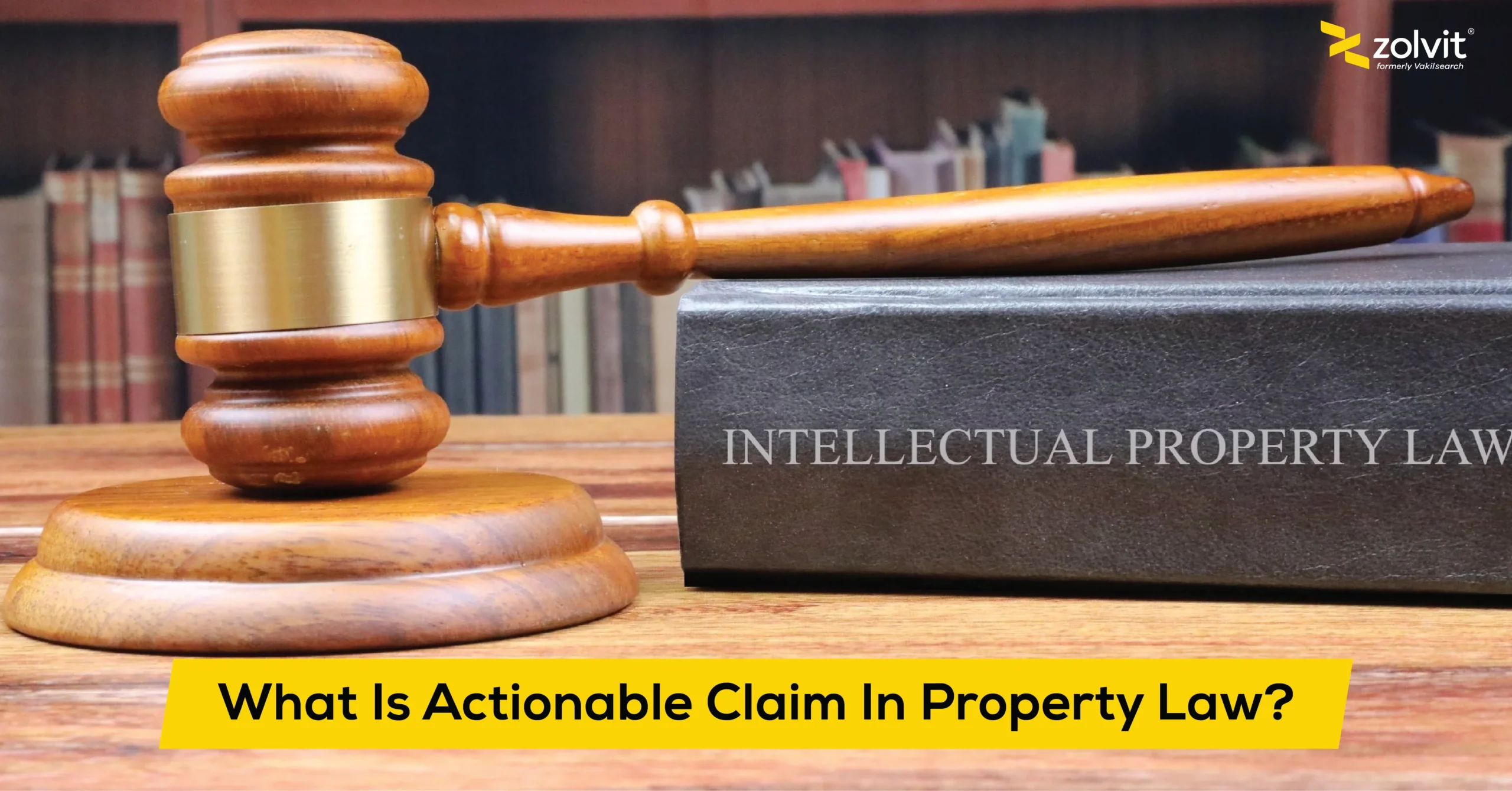An actionable claim in property law is a legal right to claim from another an amount or benefit, which is enforceable in a court of law. This typically covers a monetary claim which is not supported by a security or pledge, such as a mortgage. Thus, the claimant can sue to recover the amount due.
In this blog, it explains actionable claims in property law, their types, and legal implications. It also covers their role in property transactions and common legal challenges.
What is an Actionable Claim?
The term actionable claim pertains to a rightful claim to compensation or benefit against someone else, usually for financial consideration. This requires the classification of claims into two generic categories: Secured Actionable Claims and Unsecured Actionable Claims.
Importance of Actionable Claims in Property Transactions
These are the key importance of actionable claims in property transactions. They help secure financial interests, enforce rights, and legal compliance.
- Guarantees Legal Certainty – Sets out a legal framework for the enforcement of financial claims in property transactions.
- Protect Financial Interests – Protects individuals and businesses from loss through non-payment of dues.
- Right to Enforce – Facilitates parties in claiming advantages from lease agreements and contracts.
- Promotes Transaction – Ensures clarity in any real estate transaction by providing definitions of enforceable rights.
- Enhances Legal Compliance – Ensures property transactions align themselves with the applicable legal provisions.
Legal Concept and Relevance of Actionable Claims
As per property law, enforceable claims are a mechanism through which financial claims and contractual rights can be enforced. These claims secure interests in real estate and ensure proper transfers and enforcement of claims in line with the relevant laws that govern property transactions.
Types of Actionable Claims
Claims that are actionable can be understood by the nature of their enforceability in accordance with various legal frameworks. These claims mainly involve some financial rights and interests which may be transferred or recovered through legal means. There are three types of actionable claims, each addressing different aspects of financial and property rights. It helps individuals and businesses to understand clearly the actions of property rights and financial transactions.
Unsecured Debt as Actionable Claims
- Refer to loans that do not bear collateral for their realisation in law.
- These loans can include personal loans, credit card dues, and debts by way of an unpaid account.
Conditional or Contingent Claims
- Claims are those rights that materialize only on the fulfillment of a certain condition.
- These claims arise largely in the case of insurance claims, future inheritance, or in contracts requiring certain performance indicators to be established.
Beneficial Interest in Movable Property
- Rights available on movable property without acquiring direct ownership.
- This is generally accepted in trust, goods pledged, and contractual benefits.
Legal Framework Governing Actionable Claims
The Transfer of Property Act (TPA) of 1882 and the CGST Act of 2017, actionable claims are defined legally. These claims are the rights which are enforceable in a civil court, consisting of debts and beneficial interests in movable property.
Actionable Claims under the Transfer of Property Act, 1882
“Actionable claim” under the Transfer of Property Act, 1882 is the legal right to demand a debt (not secured by a mortgage over any immovable property or by a pledge of movable property) or beneficial interest in movable property, which the claimant is not possessing. The claim is enforceable in a civil court, and may be transferred to another person by means of a written instrument as provided in Section 3 of the Act.
Legal Rights of Actionable Claim Holders
An actionable claim is one which confers a right to the payment, delivery of goods, or supply of services from another party. The person holding such a claim can sue for the enforcement of their right.
Conditions for Actionable Claims to Become Effective
The legal condition of enforceability is fulfilled in the case of an actionable claim when it can be considered valid.
(1) It must be enforceable in a court of law.
(2) Evidence must adequately support it.
(3) It must comply with all statutory requirements.
(4) It must be derived from a lawful cause of action.
(5) It must not be opposed to the larger public interest or subjected to any limitation of law.
Actionable Claims vs. Mere Right to Sue
An “actionable claim” is a legal right to demand enforcement in court, usually involving a transferable debt or claim. Mere right-to-sue is just a right to file a suit, which is a mere allowance without giving the specific enforceable claim. This right is personal and cannot typically be assigned to another party.
Differences Between Actionable Claims and Mere Right to Sue
| Aspect | Actionable Claim | Mere Right to Sue |
| Definition | A legally enforceable claim for a debt or beneficial interest in movable property. | A personal right to initiate legal proceedings without a transferable financial claim. |
| Transferability | Can be assigned or transferred to another party. | Generally not transferable as it is personal to the claimant. |
| Legal Enforceability | Enforceable in civil court to recover money or property. | Only grants the right to sue but does not guarantee enforcement. |
| Example | A supplier’s right to recover unpaid dues from a company. | A person’s right to sue for defamation or unfair practices. |
| Nature of Claim | Involves a definite financial or property-related right. | Does not involve a concrete financial or property interest |
How Actionable Claims Impact Property Ownership
A principal actionable claim affecting property ownership is founded on the fact that it prescribes certain rights, transfers, and market value. Proper and comprehensive awareness of these effects facilitates clear title transfers and an appropriate determination of property worth.
Ownership Rights and Actionable Claims
Actionable claims affect ownership rights. Such rights enable the claimant to assert entitlements over financial interests regarding a given property. Such claims affect what the owner can do concerning the sale, lease, or transfer of property.
How Actionable Claims Affect Property Transfers and Sales
Property deals can be affected by actionable claims, since a purchaser needs to verify whether such a claim exists before proceeding to purchase. Unsettled claims may cause a delay in the process of transfer or may further complicate the transfer procedure.
Role of Actionable Claims in Property Value
The presence of actionable claims affects the market worth of property. Property pending claims may be less desirable because of the legal and financial consequences that accompany them.
Common Issues in Actionable Claims
These are common factors affecting actionable claims, requiring careful legal consideration. Establishing the existence and amount of debt requires proper documentation, such as contracts or invoices.
- In a legal proceeding whether the claim is enforceable by law, it depends on the contract provisions and the governing laws applicable to that claim.
- A critical legal requirement to notify the debtor of a claim transferred is the fact that the new creditor may not collect the debtor’s payment against him with respect to the claim without such notification.
- Claim classification also requires determination of whether the property in question can be considered movable. Only movable property qualifies as capable of being actionable claims under the law.
- The movable property in which the claimant has a claim would define the action to take against a person. Actual or constructive possession may render the claim actionless.
- The enforceability of these claims is dependent on the future event, which may cause the claim to be contingent and only become enforceable under particular conditions.
- The assignment of an actionable claim should have all legal recognition, while valid transfer would depend on compliance with legal documents and formalities.
Legal Methods for Resolving Actionable Claims Disputes
There are various legal methods that can be used to resolve disputes concerning actionable claims. These methods help ensure that claims are settled in accordance with the law.
- Litigation
Litigation is a process where a party to a dispute seeks relief from a court, where a judge makes the ultimate decision.
- Mediation and Arbitration
Basically, mediation and arbitration are alternative methods of settling matters outside the court, which usually take less time and are less costly as a third party.
- Settlement Agreements
Settlement agreements have been intended for the settlement of disputes other than the court.
How Property Lawyers Help with Actionable Claims
Property lawyers are external regulators of the disputes concerning actionable claims and provide expert legal help at any stage of the action.
Legal Advice on Actionable Claims
Any property issue would require actionable claims concerning specialized legal advice to the client, who must be made thoroughly aware of his rights and options.
Drafting and Reviewing Contracts Involving Actionable Claims
Drafting and reviewing contracts with respect to actionable claims is a way for these lawyers to protect the enforcement of the law against the clients by being directly involved.
Legal Representation in Disputes Over Actionable Claims
Property lawyers represent the client’s interests in lawsuits where another party in the dispute is related to some action leading to actionable claims.
Conclusion
Actionable claims are protecting financial interests and ensuring enforcement in property matters. However, disputes over validity and enforcement challenges can complicate the process. Expert legal guidance is necessary for addressing these complexities. Zolvit’s property lawyers specialise in resolving actionable claim disputes.
- Actionable Claims are enforceable rights to recover monetary claims or benefits through legal proceedings.
- Unsecured Debt: Loans without collateral, such as personal loans and unpaid credit dues.
- Conditional or Contingent Claims: Rights that arise only when specific conditions are met, e.g., insurance claims or inheritance.
- Beneficial Interest in Movable Property: Rights over movable assets without direct ownership, such as trust benefits and pledged goods.
- Legal Advice: Property lawyers guide clients on their rights and legal options regarding actionable claims.
- Contract Drafting and Review: They ensure contracts related to actionable claims are legally enforceable and protect client interests.
- Legal Representation: Lawyers advocate for clients in disputes involving actionable claims, ensuring their rights are upheld.
FAQs Related To Actionable Claim in Property Law
What is Section 132 of the Transfer of Property Act?
Section 132 deals with the transfer of actionable claims under the Transfer of Property Act, specifying the legal requirements for transferring such claims.
What is Section 130 of the Transfer of Property Act?
Section 130 outlines the process for transferring actionable claims through written instruments under the Transfer of Property Act.
What is an example of an actionable claim in property law?
An example of an actionable claim is the right to recover unpaid rent or dues from a tenant, which can be enforced in a court of law.
What is a contingent claim in property law?
A contingent claim refers to a right that depends on the occurrence of a certain event or condition, such as an inheritance or an insurance claim.
What are the legal consequences of transferring an actionable claim?
Transferring an actionable claim legally assigns the right to pursue the debt or interest to another party, and it must be done in writing as per the relevant legal provisions.
Can an actionable claim be enforced in court?
Yes, actionable claims can be enforced in a court of law if they are legally valid, supported by evidence, and meet statutory requirements.
What is the difference between a secured loan and an actionable claim in property law?
A secured loan is backed by collateral, while an actionable claim is a financial claim or right that is not tied to any physical property but can be enforced through legal proceedings.





